Tangerine Dream Auto Cannabis Strain Week-by-Week Guide

- 1. Grow specifications
- 2. Grow set up
- 3. Germination and seedling stage | week 1
- 4. Early veg | week 2
- 5. Mid veg | weeks 3-4
- 6. Transition (pre-flower) | week 5
- 7. Early flower | weeks 6-7
- 8. Mid flower (bulk phase) | weeks 8-9
- 9. Ripening and harvest | week 10 (and beyond)
- 10. Yield and smoke report
- 11. In conclusion
Tangerine Dream Auto is a true delight crafted for aficionados of the classic coffee shop favorite. A treasure trove for both cultivators and connoisseurs, this strain embodies the best of both worlds. As a grower, you're in for a treat with its speedy finishing time and an impressive harvest. As a smoker, prepare to experience the same tangy, sweet citrus aromas and flavors that made the original a legend. Don't miss the chance to cultivate and savor this gem that promises a symphony of sensations.
Our Tangerine Dream Auto week-by-week growing guide is meant to show you how easy it is to cultivate this autoflower indoors but also to let you glean additional info as to this strain’s timeline, nutrient needs, expected size, etc.Read our guide and be at your top game growing Tangerine Dream Auto.
1. Grow Specifications
Tangerine Dream Auto embodies the art of growing with grace. As a feminized autoflowering marvel, it blends the genetics of Tangerine Dream and Autoflower #1, resulting in a 60% Sativa and 40% Indica composition that adapts seamlessly to both hot and temperate climates. A true gem for growers, it showcases its magic within just 70 to 75 days from seed to harvest. Standing at an indoor height of 60-70cm, this strain's compact stature belies its impressive yield potential of up to 500g/m² indoors and outdoors.
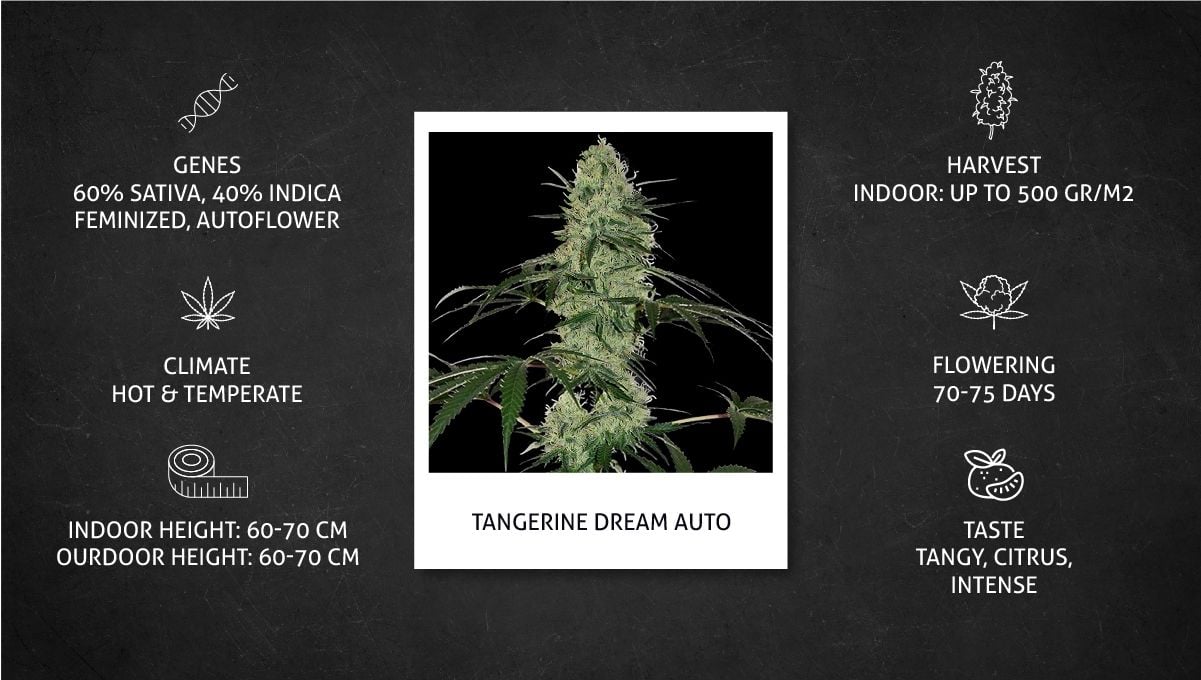
When it comes to savoring Tangerine Dream Auto's smoke, it leaves you in awe with its quality. The taste is a symphony of tangy, citrusy notes dancing on your palate, accompanied by an intense and refreshing aroma reminiscent of mandarins and sweet citric delights. The effects are a harmonious blend of balance and relaxation, leaving you utterly relaxed yet enthusiastic and up to any task.
2. Grow Set Up
Tangerine Dream Auto is incredibly popular among growers, making it very easy to find excellent grow reports online. Among the plethora of perfectly written grow diaries, we've selected two that showcase this autoflower's performance both in DWC (hydroponics) and in soil. As expected, the yield and bud quality were superior in hydroponics, and, more importantly, the growth cycle was a few weeks shorter. Nevertheless, we can assess the results of both growths as outstanding, and you can rest assured that regardless of the setup or medium you choose, Tangerine Dream Auto will deliver its results. Below, you can review the characteristics of the DWC growth.
| Grow Space: | 1 m2 (10.76 ft2) | Pot Size: | 8 l (2.11 gal) |
|---|---|---|---|
| Seed to Harvest: | 12 weeks | Medium: | DWC |
| Flowering: | 7 weeks | Nutrients: | Synthetic/Organic |
| Light Cycle: | 18/6 | pH Levels: | 6.0 |
| Light Type: | LED | Day Temperature: | 24°C (75°F) |
| Watts Used: | 750 | Humidity: | 50-60% |
The beauty of this autoflower lies in its ability to readily adapt to a variety of conditions. However, it's advisable to consider experimenting with larger grow tents to prevent running out of space during the flowering stage.
3. Germination And Seedling Stage | Week 1
When you're growing cannabis indoors, it's all about making the right environment throughout the whole process. This is especially important in the first few weeks of the plant's life. Young sprouts really like mild spring-like conditions. That means no crazy temperature swings and keeping things nice and moist in both the soil and the air. So, your goal is to recreate these conditions in your grow room.
| Plant Height: | 2 cm | Humidity: | 60% |
|---|---|---|---|
| Distance to Light: | 25 cm | pH: | 6.0 |
| Day Temp: | 24°C (75°F) | Night Temp: | 21°C (70°F) |
Germinating cannabis seeds can be done in various ways. You can start by simply planting them around half an inch (or 1 cm) deep in moist soil. However, we wouldn't recommend this method for beginners. The reason is, it doesn't let you check if the seed has cracked and a taproot is showing. This lack of feedback can make the whole waiting game, waiting for the sprout to pop up, pretty nerve-wracking.
A better approach is to take the seed and keep it between damp paper towels for a day or two. When the taproot gets long enough, you can put it into a small hole in the growing medium. This way, you'll have a definite confirmation that the seed is alive and likely to sprout.
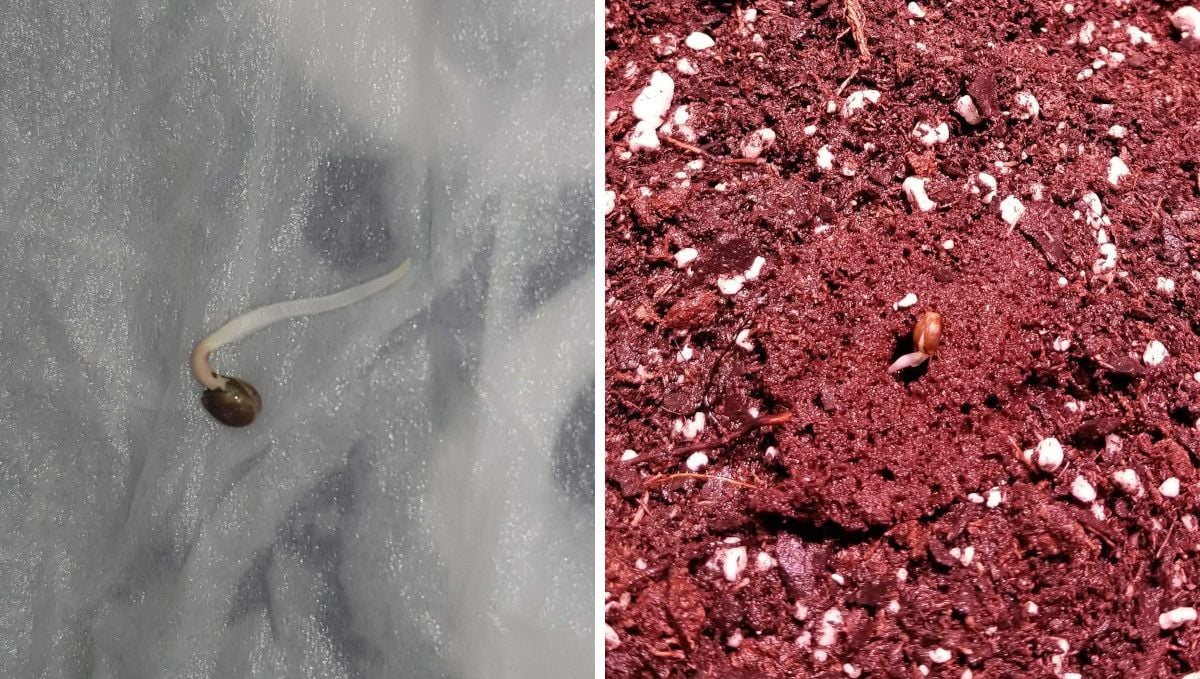
Once the seedling has emerged, you won't really need to do much except provide a small amount of water each morning. Watering becomes quite simple if you keep the sprout in a solo cup — just use around 50 ml of plain water to dampen the growing medium. When dealing with larger pots, it becomes a bit more complex. You'll likely need to water approximately the same amount around the base and then slowly increase both the watering area and the volume of water until the entire container starts to get moist.
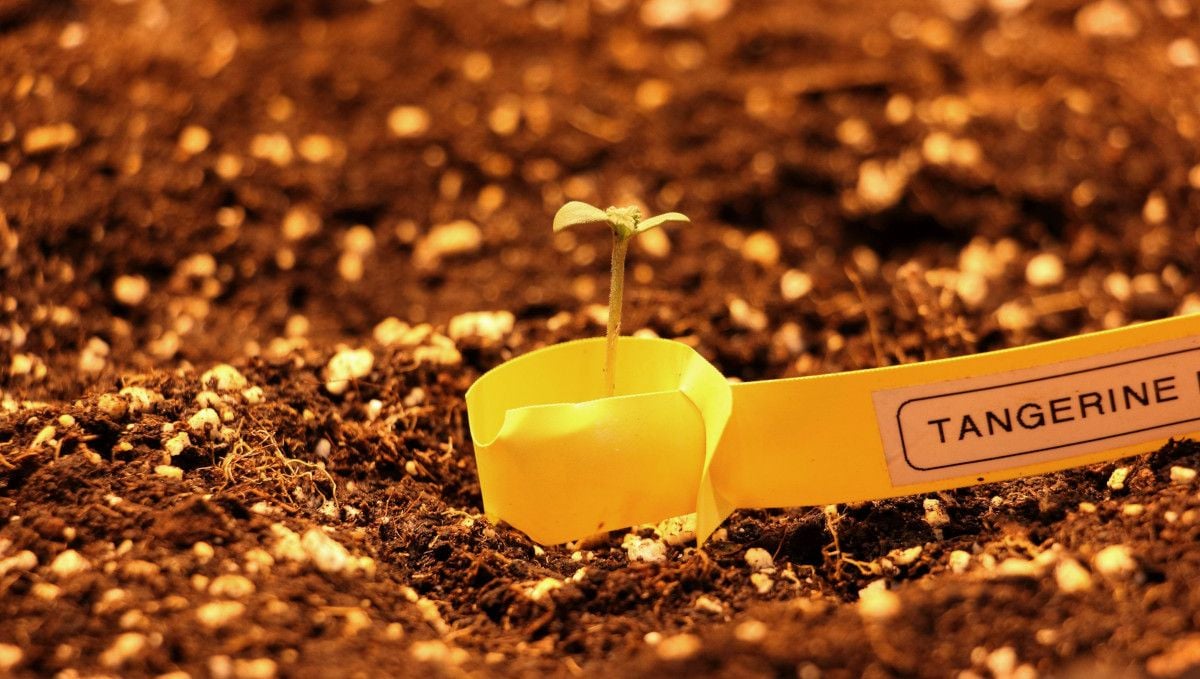
Of course, DWC (Deep Water Culture) requires a different method. You'll likely start your seed in a jiffy plug or a rockwool cube. Once the roots begin to show, you'll place them into a medium, such as expanded clay pebbles. When it comes to watering, there are two ways to go about it. You can either water from above (as shown in the photo) or from below, where the root tips are allowed to float freely in the consistently aerated nutrient solution.
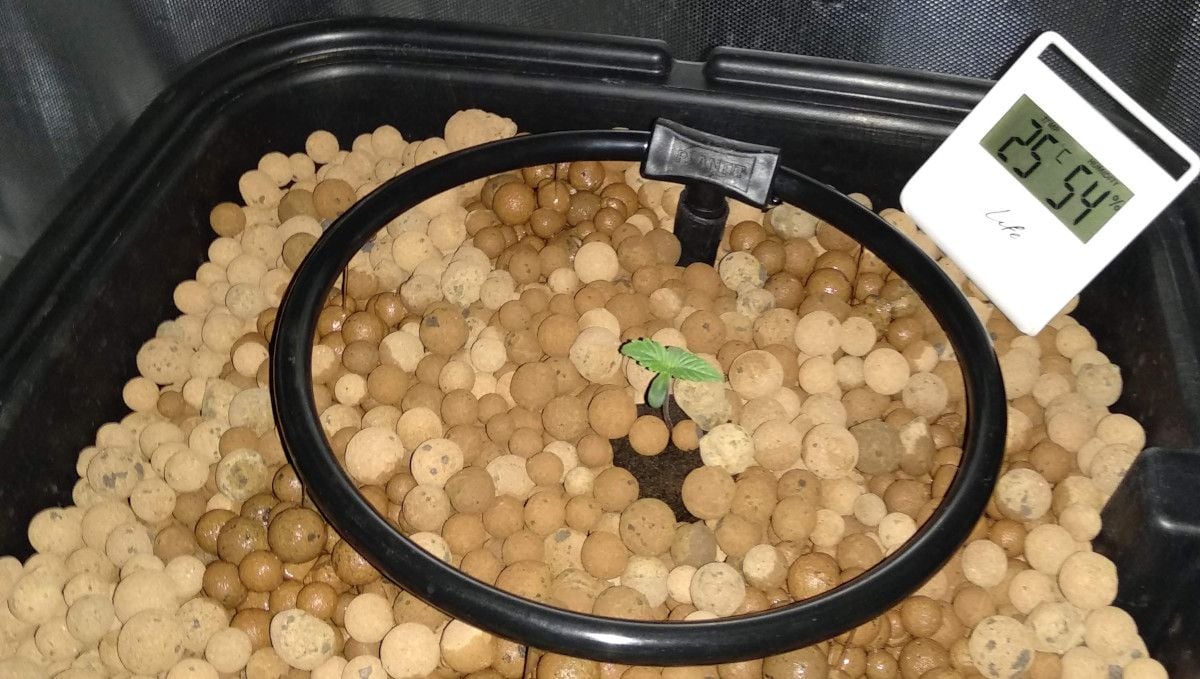
4. Early Veg | Week 2
During the second week, there isn't much alteration in the environmental needs of your growing plant. It continues to require warm temperatures and high humidity. With increased relative humidity (RH), the leaves don't release moisture too rapidly, reducing the risk of wilting.
| Plant Height: | 3 cm | Humidity: | 60% |
|---|---|---|---|
| Distance to Light: | 25 cm | pH: | 6.0 |
| Day Temp: | 24°C (75°F) | Night Temp: | 21°C (70°F) |
Your autoflower's root ball is still in the process of growth and has quite a journey ahead, but by now, it's sturdy enough to facilitate a faster development of what you observe above the soil – the new sets of true leaves. This leads to faster growth rates. Assuming all is going smoothly, you'll notice changes occurring each day. However, if things aren't progressing as expected, it means that the plant might not be responding well to some (or all) of the conditions you've established.
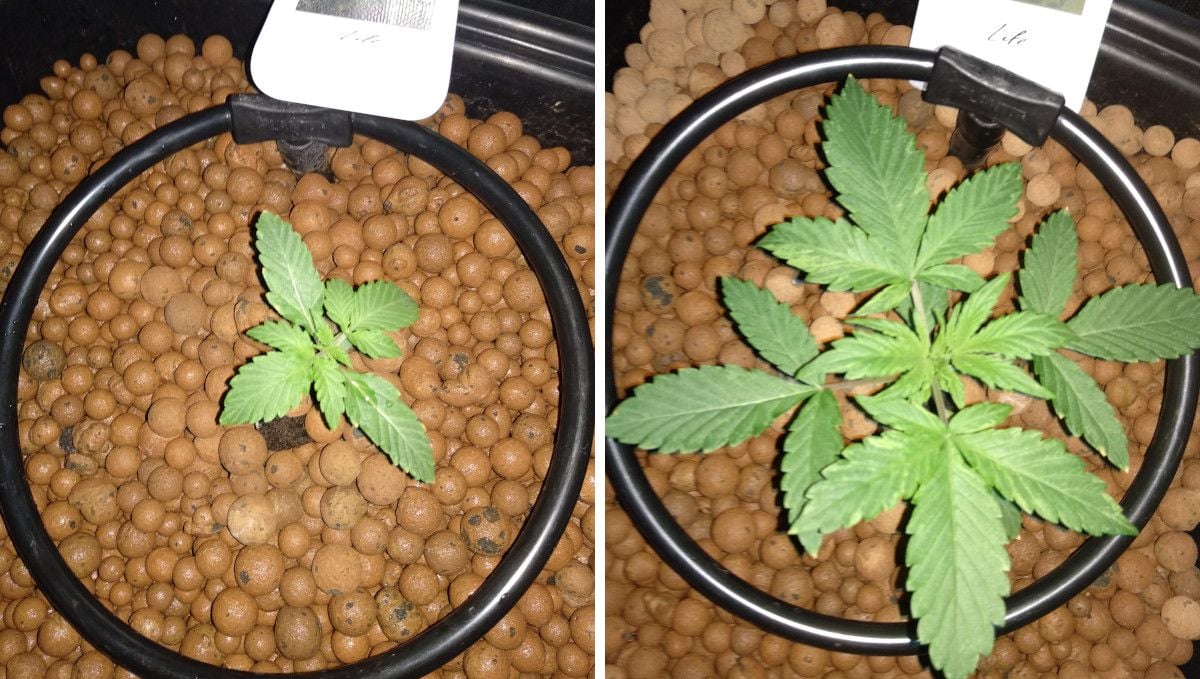
Your Tangerine Dream Auto's growth will notably accelerate, particularly in hydroponic setups. This is primarily because hydroponic systems provide the roots with two crucial elements they highly appreciate – water infused with nutrients and oxygen – simultaneously. In soil cultivation, the act of watering temporarily limits the oxygen supply to the root area, which consequently affects growth rate, making it slower in comparison to DWC (Deep Water Culture).
Of course, in hydroponics, your weed plants have no other source of nutrients than what you give it in your watering solution. This means that you need to provide some kind of fertilizer from day one. Please find below a sample nutrient schedule for the vegetative stage.
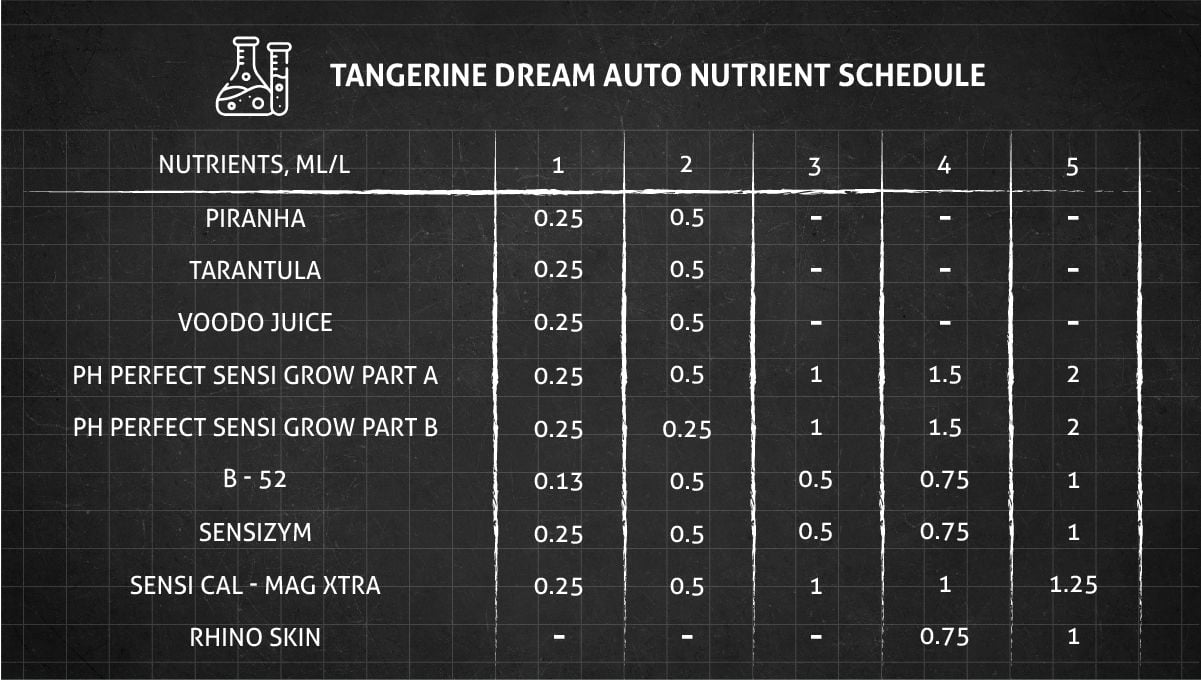
In soil grows, it's a completely different story – here, it is safe to not give your weed plant any extra nutrients for at least the first two weeks (provided that you use a container large enough). You can read more about the art and science of using a pot of an appropriate size in the article below. You can even get away with not giving your plant any extra nutrients for the entire life cycle – if you use what growers call super soil.
5. Mid Veg | Weeks 3-4
By the second half of the first month from seed, the root structure of your young plant will be strong enough to handle a higher load on the above-ground part. So, if the temperatures are too high or too low or there isn’t enough moisture in the air, in short, if the conditions are slightly off, your autoflower will handle all this like a champ.
| Plant Height: | 10-25 cm | Humidity: | 60% |
|---|---|---|---|
| Distance to Light: | 25 cm | pH: | 6.0 |
| Day Temp: | 24°C (75°F) | Night Temp: | 21°C (70°F) |
The main change happening now compared to the previous weeks is the active growth of side branches. There will be something new appearing every day – the fan leaves will grow larger and the side branches will extend. Expect much faster growth rates in hydroponics compared to soil – this medium is famous for giving a huge boost to the vegetative growth.
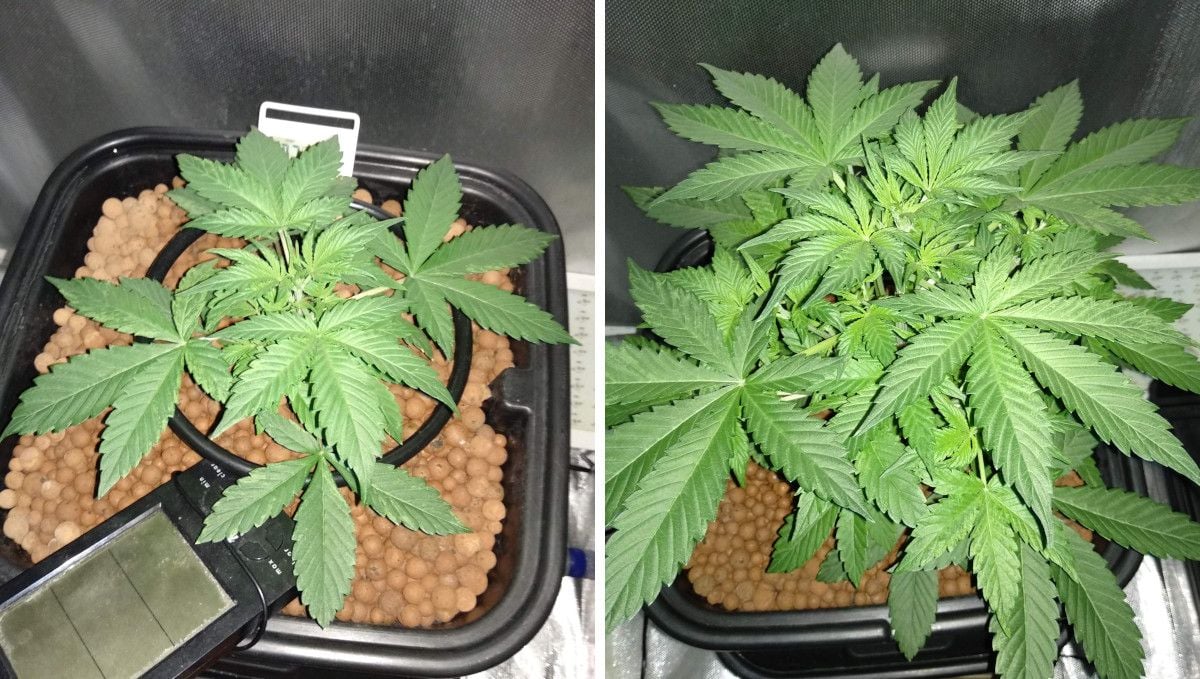
Modern autoflowers are versatile enough to thrive in any growing medium, and soil, perhaps amended with perlite, is no exception. Tangerine Dream Auto has a tendency to grow quite large and form an insane amount of branches, and this tendency is the same no matter what growing method you use. However, you can see in the photos below how easy it is to overwater your plants in soil grows. If you water too much or too frequently, the leaves are likely to start clawing and the growth may slow down.
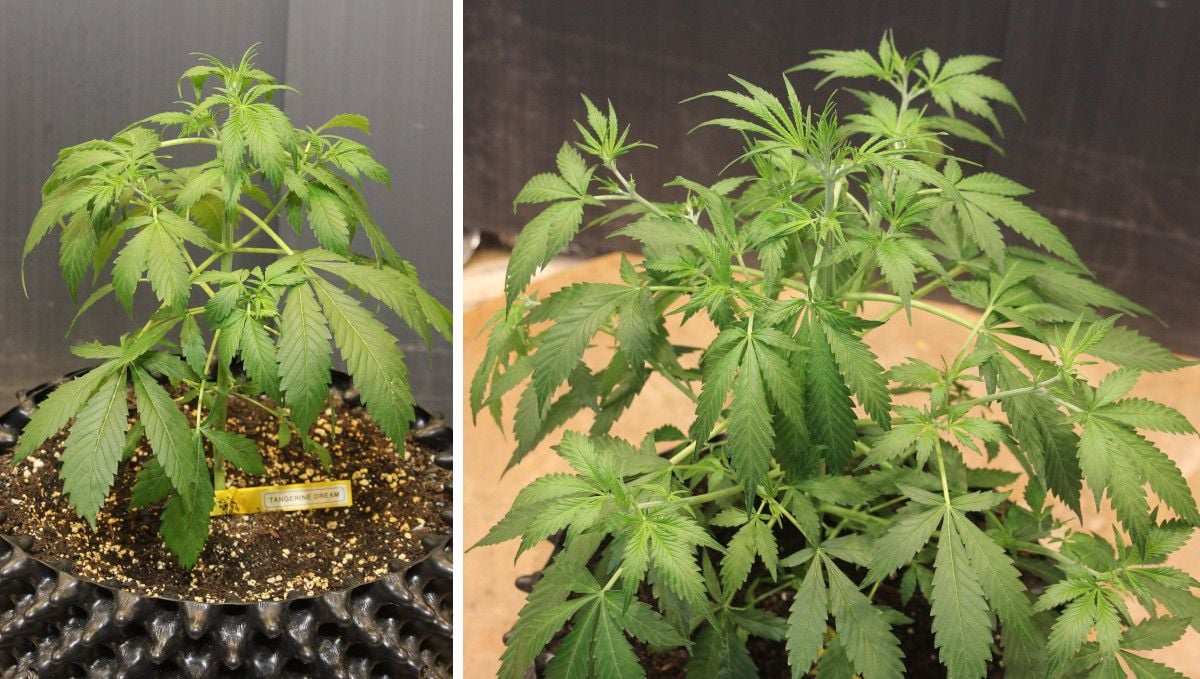
Indoor growers routinely train their autoflowers, mostly because of the limitations in vertical space. As for Tangerine Dream Auto, think twice before starting to train it. If your goal is to limit its height, by all means use some training method or other. Otherwise, if you just want to use training to stimulate side growth, don't bother – Tangerine Dream Auto has such a remarkable tendency to bush out, that you'll get a bushy plant with no training whatsoever.
6. Transition (Pre-Flower) | Week 5
As your Tangerine Dream Auto progresses into the pre-flowering stage, it will experience rapid growth in size. Your current objective is to ensure that the upper parts of the plant maintain an ideal distance from the light source. It's a widely recognized principle that cannabis plants thrive under intense light, yet even in this case, there's a limit to the benefits. Be attentive to raising your light source or reducing its intensity as the upper parts of the plant draw nearer to it.
| Plant Height: | 45 cm | Humidity: | 60% |
|---|---|---|---|
| Distance to Light: | 25 cm | pH: | 6.0 |
| Day Temp: | 24°C (75°F) | Night Temp: | 21°C (70°F) |
The transition from vegetative growth to flowering is typically quite noticeable though the initial indications might not be overly apparent. We're referring to the first small hairs that start emerging around the middle nodes. However, these same white hairs, technically known as pistils, will eventually appear at the tops as well. Additionally, the new leaves that sprout here will adopt a more yellowish hue and become rather delicate, making them almost blend in with the hairs.
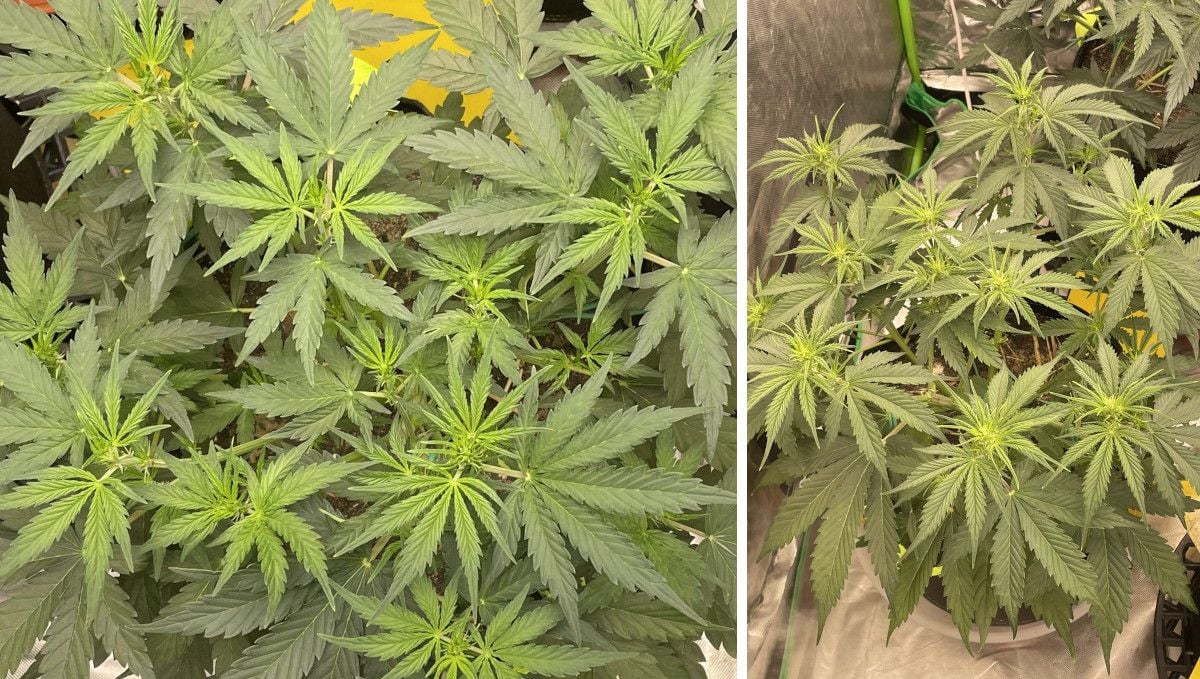
The areas where these hairs are emerging will eventually develop into buds. Your objective now is to ensure that each of these upcoming bud sites receives direct light. To achieve this, you can employ techniques like training, leaf tucking, and defoliation. In the case of a taller autoflower strain such as Tangerine Dream Auto, defoliation also proves useful in moderating the growth of the longest side branches that might otherwise dominate the others.
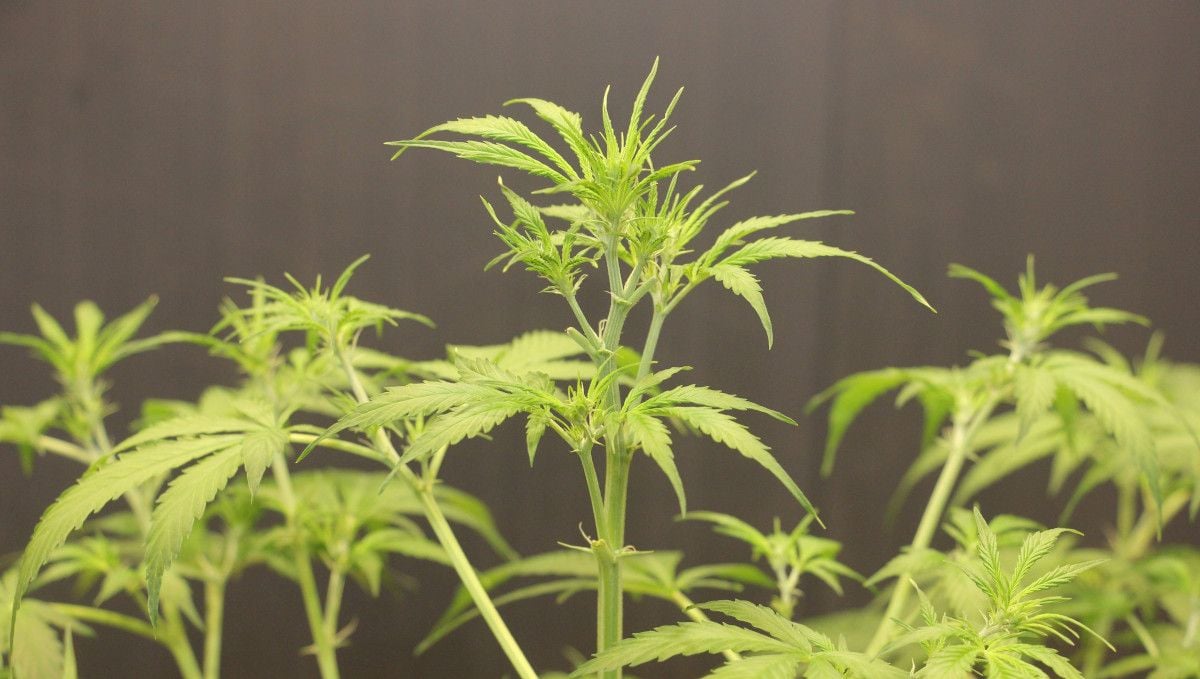
Of course, as your autoflower changes gear, its nutrient requirements will undergo a complete transformation to support its optimal growth. At this stage, its demand for nitrogen will decrease, while the need for phosphorus and potassium will intensify. These two macronutrients are crucial for fostering the growth of big, fat, and dense buds. Please find below a sample feeding schedule tailored for the flowering stage.
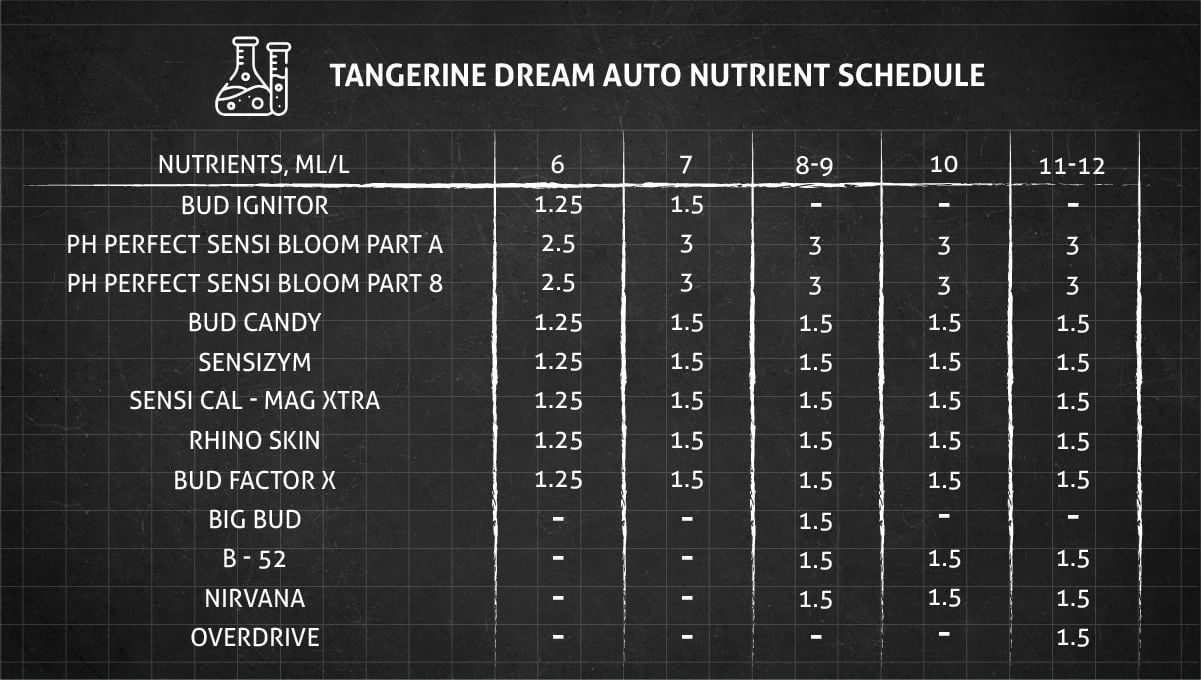
While addressing the nutritional needs of your autoflower, it's crucial not to overlook something known as the flowering stretch. This can often catch novice growers off guard, as there's a common misconception that the plant solely grows during the vegetative phase, and once flowering initiates, growth halts and the focus shifts solely to larger bud development.
However, this notion couldn't be further from reality. Your plant is likely to experience an increase in size of at least 50% after the onset of flowering. In the case of an autoflowering Sativa strain like Tangerine Dream Auto, you might even witness an expansion ranging from 100 to 200%.
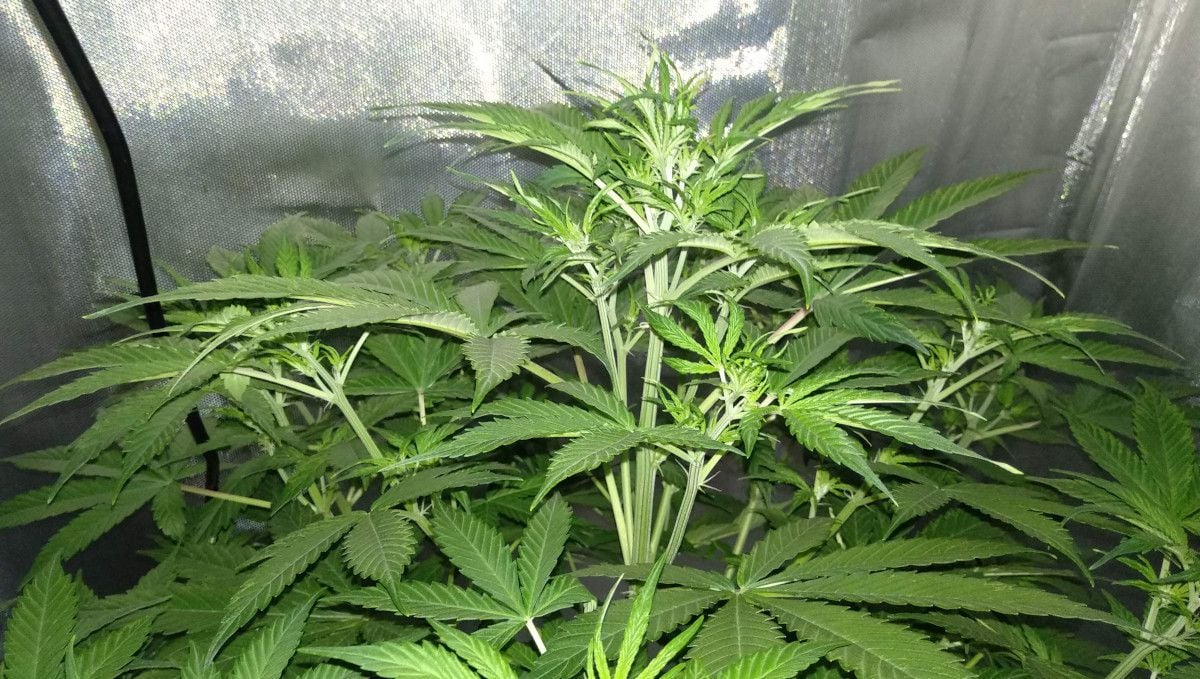
7. Early Flower | Weeks 6-7
During this stage, the stretch that your plants undergo can make you uneasy. The good news is that sometime during these 2-3 weeks the stretch will eventually stop, hopefully, before you run out or vertical space. We haven't said anything about the pH levels yet. The correct pH level depends on the medium you use. In soil grows, it should be between 6.0 and 6.5, and in hydroponics, between 5.5 and 6.0.
| Plant Height: | 72-95 cm | Humidity: | 60% |
|---|---|---|---|
| Distance to Light: | 35 cm | pH: | 6.0 |
| Day Temp: | 24°C (75°F) | Night Temp: | 21°C (70°F) |
During this stage, the most noticeable changes will include the main stem reaching towards the light and the side branches elongating, nearly matching the main stalk in length. As for the buds themselves, they'll begin to take shape, yet they might appear wispy and lacking substance. This holds particularly true for Sativa autoflowers, whose buds typically lack the compact, round appearance of Indicas. However, owing to their extended flowering periods, Sativa autoflowers eventually produce substantial, voluminous buds.

As we have said, Tangerine Dream Auto has a tendency to grow quite tall and very bushy. Usually, autoflowers reach the final height sometime around week 8, but this strain may continue growing for a couple of weeks more.
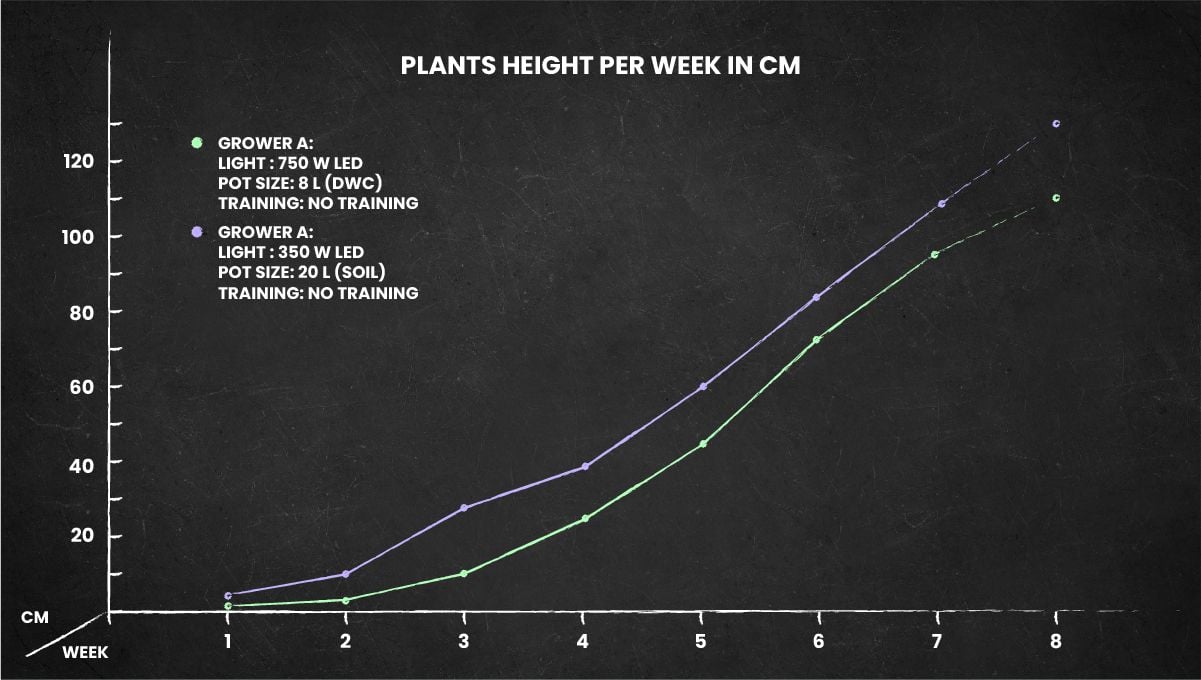
With what seems like a hundered smaller branches on one plant, Tangerine Dream Auto may make you feel depressed thinking about days of back-breaking work involved in trimming those buds post-harvest. But this is the price you have to pay for choosing a high-yielding variety.
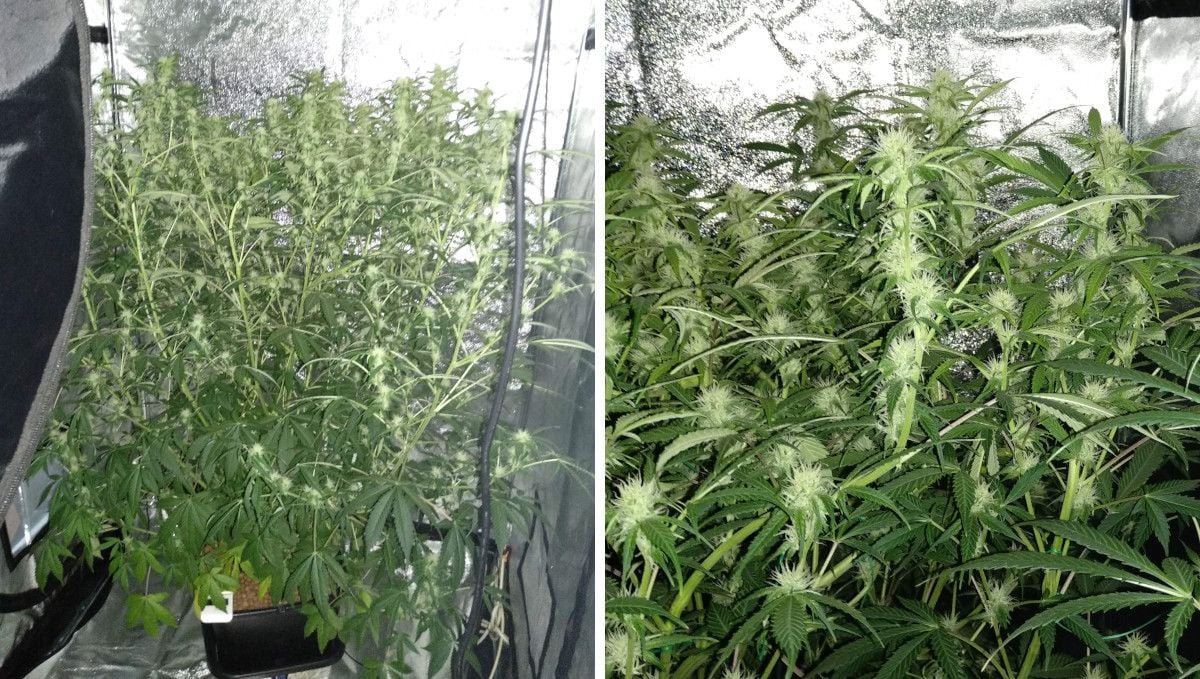
8. Mid Flower (Bulk Phase) | Weeks 8-9
The bulk phase calls for a slight change in conditions. In the first place, we recommend reducing the relative humidity in the grow room, as too high levels are likely to cause fungal infections -- from mold and bud rot to powdery mildew. This might be less of an issue for Sativa strains as Sativas are children of the tropics accustomed to thrive in hot and humid conditions, but even their loose and fluffy flowers can get moldy when exposed to high RH for too long.
| Plant Height: | 110 cm | Humidity: | 60% |
|---|---|---|---|
| Distance to Light: | 10-30 cm | pH: | 6.0 |
| Day Temp: | 24°C (75°F) | Night Temp: | 21°C (70°F) |
When your Tangerine Dream Auto turns into an entangled mess of branches, leaves, and buds, do what you can to ensure proper airflow both inside and below the canopy by strategically placing oscillating fans and of course, running a powerful extraction fan.
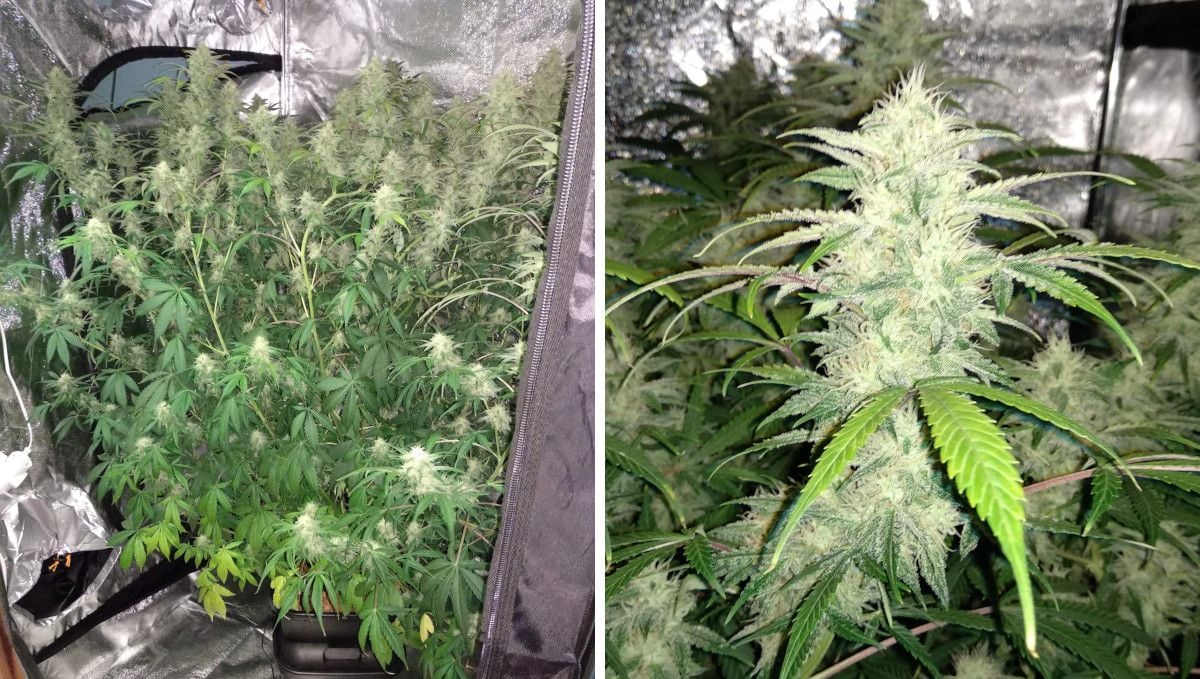
When growing Sativa autoflowers, the colas tend to grow long but not especially dense. As for their circumference, they can stay narrow (as in the photo below) or get ridiculously fat over time -- that depends on the genetics.
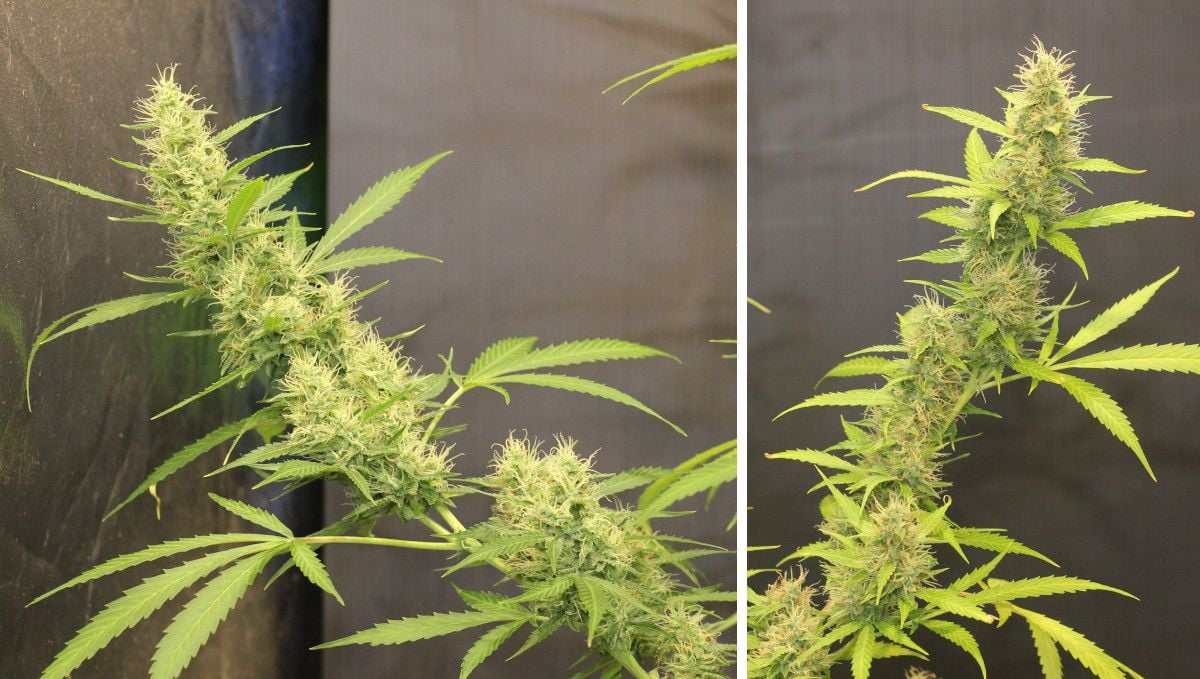
In the photos above, you can see a great number of white hairs on Tangerine Dream Auto buds. This is usually a sign of immaturity, signalling that they still have several weeks to go.
9. Ripening And Harvest | Week 10 (And Beyond)
The last weeks leading up to the harvest should be the time when you keep paying extra attention to lowering the relative humidity to something like 35-40%. Also try to keep the temperatures in check. Lower day temps (around 23°C) will help you conserve terpenes in buds and probably THC and other cannabinoids too. Lower night temps not only give the plant a period of rest but can also cause some buds to become purple (if your autoflower has any 'purple' genes, of course).
| Plant Height: | 110 cm | Humidity: | 50% |
|---|---|---|---|
| Distance to Light: | 30 cm | pH: | 6.0 |
| Day Temp: | 24°C (75°F) | Night Temp: | 21°C (70°F) |
Some flowers may continue swelling and getting visibly bigger almost to the very end. Sativas do that especially often. However, in most cases, buds stop growing at a certain point. It doesn't mean though that they don't get heavier -- they do, and this happens because they become denser on the inside.
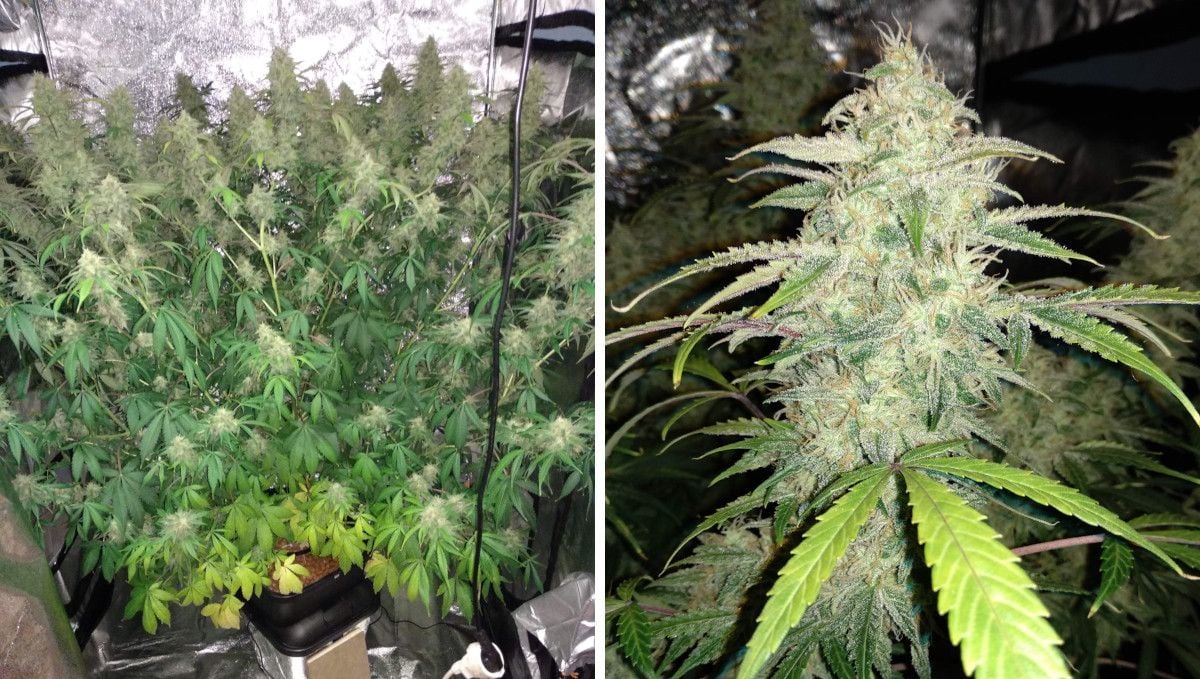
When you see that days are passing but the buds hardly change their looks, you may think that you should probably harvest them already. Maybe you should, but you'll never know for sure until you look at the buds through a hand microscope. Cannabis flowers and the little 'sugar' leaves growing next to them get covered in trichomes, which are tiny mushroom-like glands full of resin. Only if these glands become milky-white with an occasional amber, it means their potency has reached a peak.
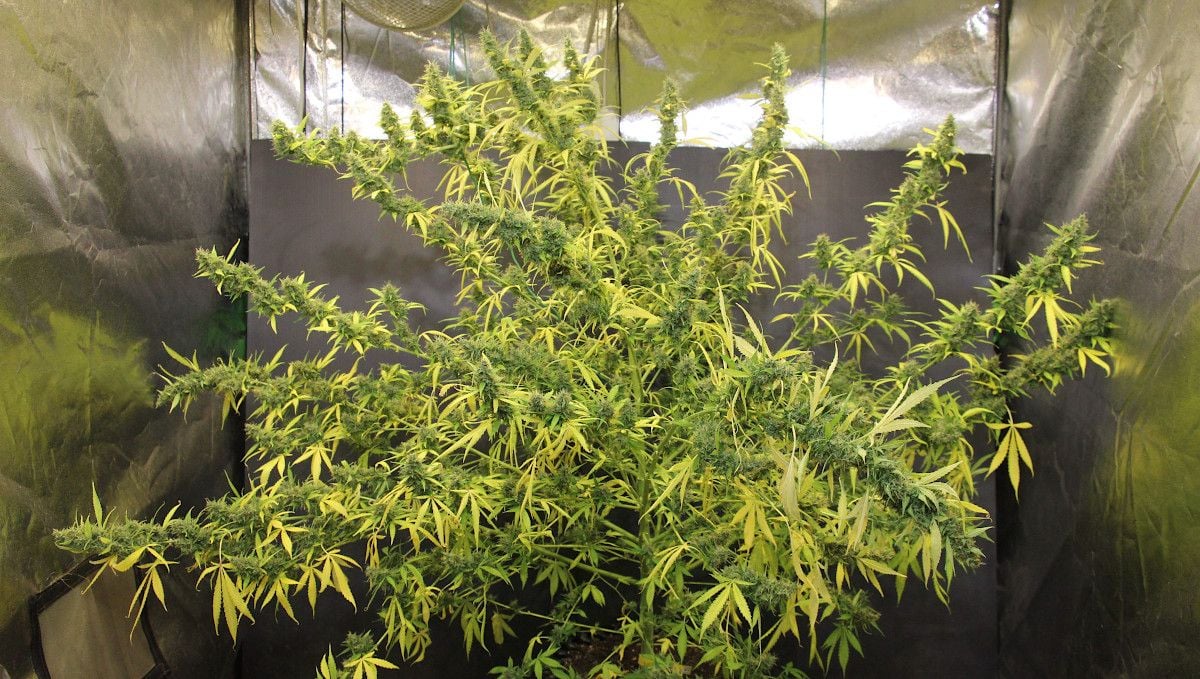
All other methods of determining whether your cannabis is ready for harvest or not are only approximations, but none of them is exact. For instance, you can say that the harvest is near when the pistils turn from white to brown, withered, twisted, and dry. The fan leaves may start to fade too, and even the breeder's specifications as to the expected seed-to-harvest time may give you a rough idea, but it's arguably the least exact method.
While you're waiting for the perfect window to chop your plant, don't forget that you also need to switch form a nutrient solution to pure water at some point. This is called flushing, and its purpose is to clean the medium and the plant itself of all harmful residue left by nutrients. In hydro, flushing lasts for about a week, in soil, it may take up to 2 weeks.
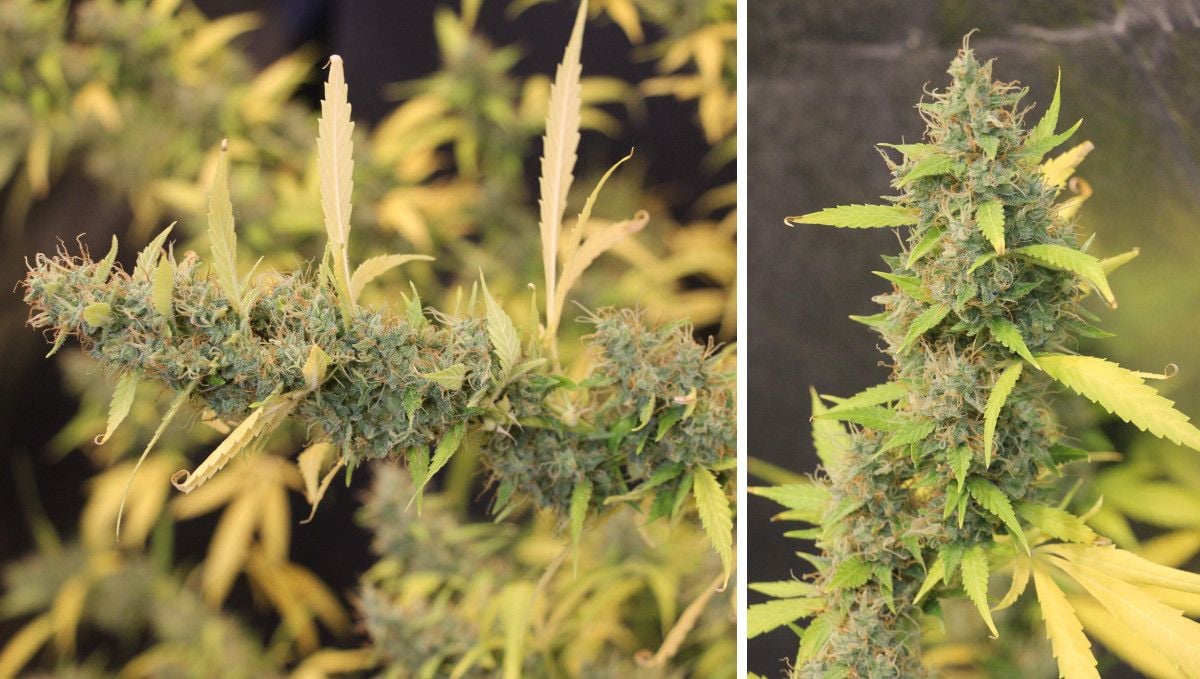
After you cut down your Tangerine Dream Auto plant (hopefully, at the best possible moment), you will do yourself a great favor if you first slowly dry it and then cure it for at least 2-3 weeks in glass jars. These processes go way beyond the simple removal of excess moisture from the buds -- they also radically change the quality of the smoke, meaning its smoothness, smell, taste, and potency.
10. Yield and Smoke Report
It's almost unbelievable to get 200 g (7.05 oz) from just one autoflower cultivated indoors in soil, but this grower did it. Great job!
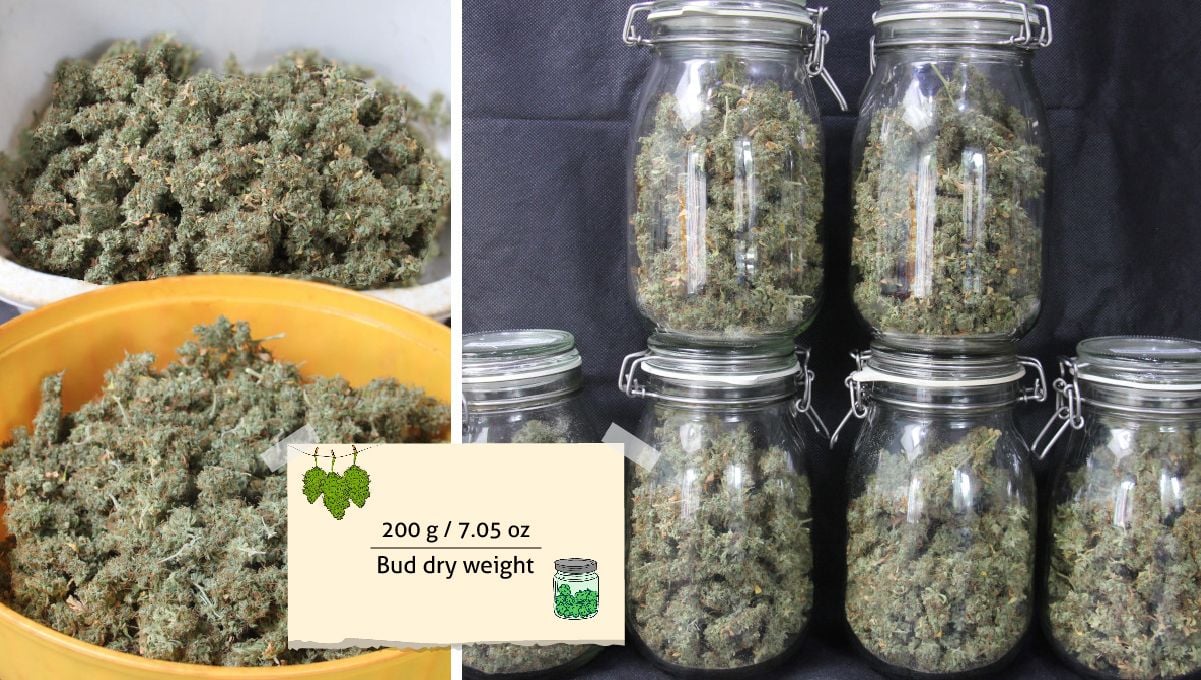
Turns out it's possible to top even that, at least if you grow your weed hydroponically and know what you're doing. The second of the two growers we've been following harvested 230 g (8.11 oz), and it only took him 12 weeks from seed.
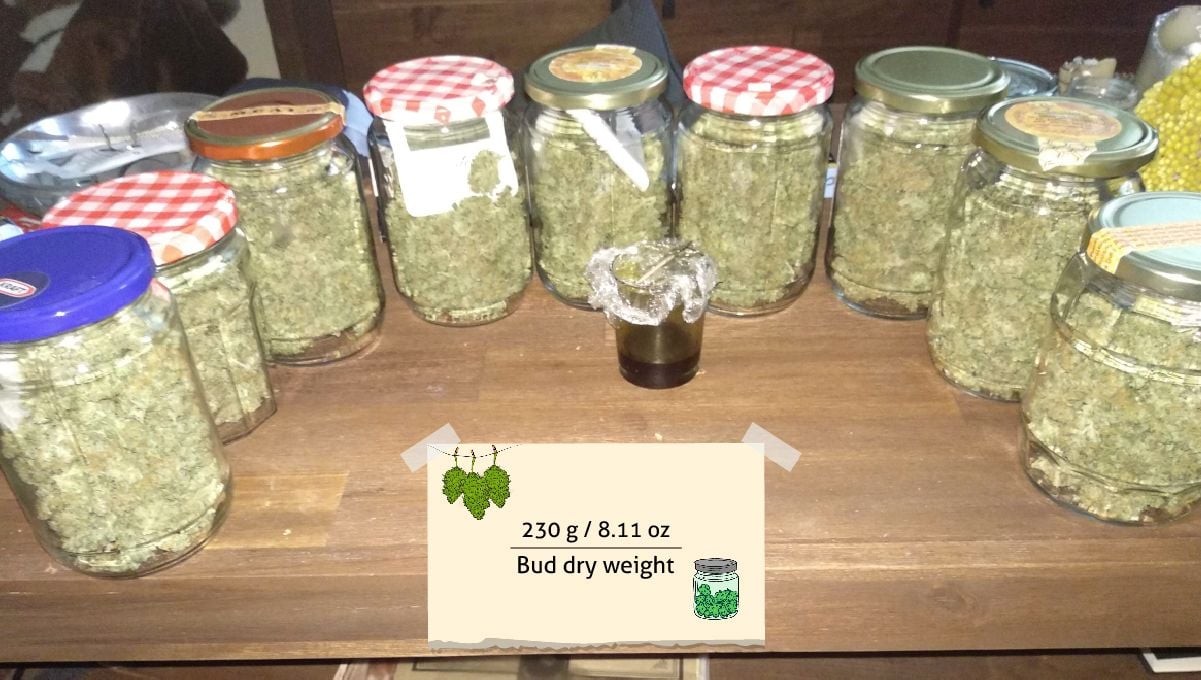
The smokers of Tangerine Dream Auto describe a robust bouquet of sour citrus, orange, and tangerine that envelopes the senses, hinting at the delight to come. The taste echoes this promise, offering a seamless fusion of floral, fruity, and sharp citrus notes.
This strain's effects harmoniously bridge the gap between sativa and hybrid, ushering in an energetic and focused high that evolves into a mellow, joyous state. With potency that ranges from uplifting to physically relaxing, Tangerine Dream Auto is an ideal daytime companion, sparking positivity and creative inspiration.
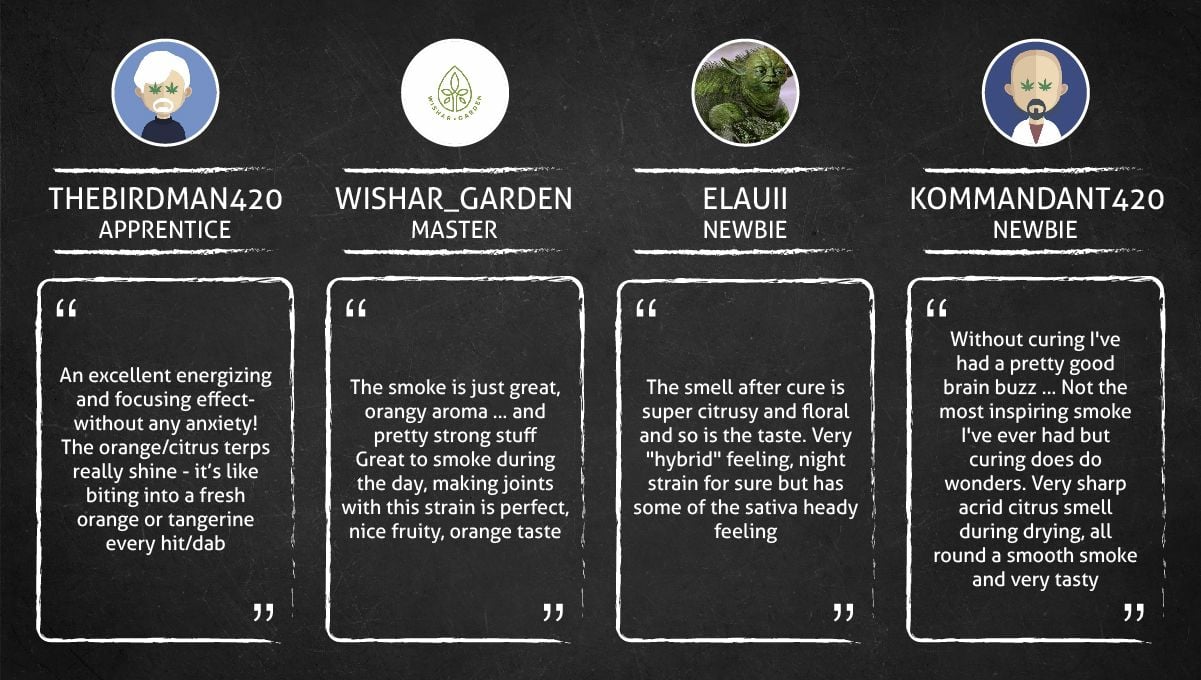
11. In Conclusion
Judging by the two grows that have formed the backbone of our guide (plus some others that we have seen), Tangerine Dream Auto is a tall, naturally bushy strain. Its main stem is barely taller than other branches, and you don't really need any form of training to get this wide, multi-branch structure. The training will be of use though if your vertical space is limited.
You'd better install powerful lights as Sativa-leaning varieties, including Tangerine Dream Auto, tend to stretch too much if they receive too little light. At the same time, they usually display only moderate appetite for plant food. This autoflower seems to be tolerant of heat and handles high humidity better than most.
Tangerine Dream Auto can be quite fast, especially if you create ideal conditions during the vegetative stage, e.g., using hydropinics. However, if the growth in veg is slow, the plant is likely to compensate during flowering -- it may take a few weeks longer, but the yields will be proportionately higher.
What you probably shouldn't expect from Tangerine Dream is an especially dense texture and a full, round structure of buds. This isn't an Indica, and the flowers are more likely to be loose and light. Anyway, that's what's expected of Sativa weed, and there shouldn't be any cause for complaint. And you have already seen what the yields produced by this strain could be -- next to incredible.
In short, Tangerine Dream Auto is definitely worthy of your attention. Don't hesitate trying one, and if you've already bought some seeds, you're in for a treat. Happy growing!









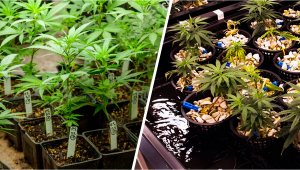
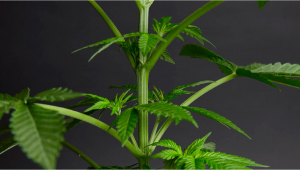


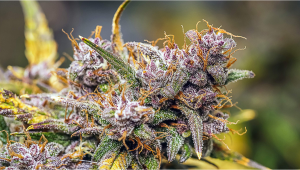


Comments